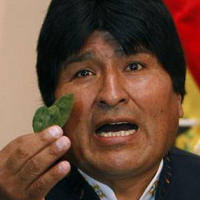Bolivia Reduces Coca Production…after Kicking out the DEA
 Bolivian President Evo Morales displays a coca leaf (AP photo)
Bolivian President Evo Morales displays a coca leaf (AP photo)
The slash, burn and arrest policies of the Drug Enforcement Administration (DEA) have seemingly done little to stop drugs such as cocaine moving from South American producers to U.S. consumers. But one country has found a different path to cutting cocaine production and it has done it without help from the United States.
Bolivian President Evo Morales kicked the DEA out of his country in 2008. Since then, his government has begun a policy of getting growers to cut production of coca leaves, the foundation for cocaine, by substituting some of the coca with other crops, such as pineapples and bananas, developing the infrastructure of coca-producing regions and allowing for some coca, which is legal to be chewed or used to make tea, to be grown.
The policy has worked. A report (pdf-Spanish) by the United Nations Office on Drugs and Crime (UNODC) showed that Bolivia’s coca cultivation fell 11% in 2014 over the previous year. The amount of land being used for coca production in Bolivia is now at 20,400 hectares (about 79 square miles), the lowest number since the UN began its surveys in 2003. The amount of land being used for coca cultivation is down a third since 2010.
“It’s not only about making money off a crop,” Antonino de Leo, UNODC’s representative in Bolivia, told Vice News. “In the old fashioned alternative development approach, we substitute one illicit crop for a licit crop. It’s about a more comprehensive approach that includes access to essential services like schools, hospitals, and roads in areas that traditionally have been hard to reach.”
Bolivia’s go-it-alone approach and success has apparently ruffled feathers in the U.S., and the two countries have clear differences in policy when it comes to the drug war. “While the U.S. pushes for criminalization, persecution and forced eradication, Bolivia has moved more towards legalization, regulation, and cooperative control,” wrote Fusion’s Tim Rogers. “Consuming coca, the plant used to manufacture cocaine, is legal in Bolivia. People chew the leaves for energy, or use them to make tea. Coca is also used as a key ingredient in the Bolivian energy soft drink Coca Colla.”
“U.S criticism is clearly politically motivated,” Coletta Youngers, co-author of a research report on Bolivia’s drug war efforts, told Fusion. “There are still people in Washington who feel deeply wounded that the DEA was thrown out of Bolivia. Just because the U.S. is not a main actor doesn’t mean there isn’t a serious effort to limit the flow and production of coca. The DEA is overrated.”
The UN, however, is pleased enough with Bolivia’s efforts that it has given Morales’ government a five-year, $72 million package to continue its efforts, according to Rogers.
Still, some Bolivian coca is still being turned into cocaine and the country remains a transit point for drug shipments from other parts of South America. There are also concerns that drug traffickers could gain influence in the country. But neighboring countries such as Colombia and Peru might benefit by adopting some of Bolivia’s methods.
-Steve Straehley
To Learn More:
2014 Bolivia Survey Reports Decline in Coca Cultivation for Fourth Year in a Row (United Nations Office on Drugs and Crime)
How Bolivia Became a Drug War Success Story—After Ousting Uncle Sam (by Tim Rogers, Fusion)
How Bolivia Got Smart and Convinced Poor Farmers to Grow Less Coca (by Samuel Oakford, Vice News)
- Top Stories
- Unusual News
- Where is the Money Going?
- Controversies
- U.S. and the World
- Appointments and Resignations
- Latest News
- Trump Orders ICE and Border Patrol to Kill More Protestors
- Trump Renames National Football League National Trump League
- Trump to Stop Deportations If…
- Trump Denounces World Series
- What If China Invaded the United States?






Comments